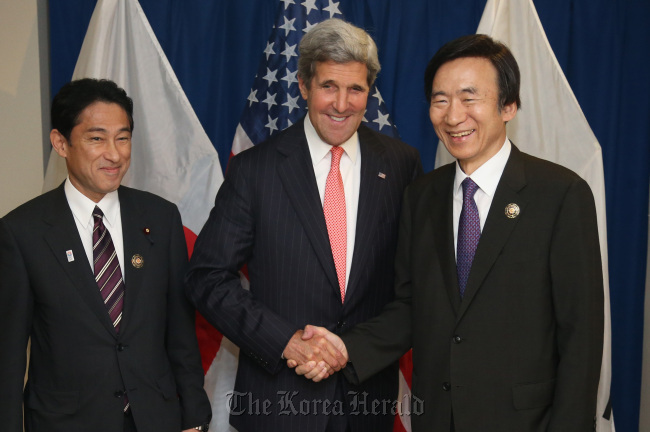A day after Seoul and Tokyo pulled off a compromise in their sex slavery row, the U.S., the U.N. and other actors in the international community churned out praise and support, displaying hopes for an end to the decades-old historical animosity.
While acknowledging the need for Japan to follow through on its promises, they stressed the significance of what is supposed to be a “final and irreversible” closure of the dispute that has long plagued relations between the two neighbors and staunch U.S. allies.
Washington, which has been a major driving force behind the settlement, swiftly offered praise from various fronts and expressed optimism for greater trilateral security cooperation in the years to come.
“We support this agreement and its full implementation, and believe this comprehensive resolution is an important gesture of healing and reconciliation,” National Security Adviser Susan Rice said in a statement issued Tuesday by the White House.
 |
|
Foreign Minister Yun Byung-se (right), U.S. Secretary of State John Kerry (center) and Japanese Foreign Minister Fumio Kishida pose before their talks on July 1, 2013 in Bandar Seri Begawan, Brunei. (Yonhap) |
Secretary of State John Kerry hailed President Park Geun-hye and Japanese Prime Minister Shinzo Abe for having the “courage and vision to forge a lasting settlement to this difficult issue.”
“They have made clear that by implementing this agreement they will ‘finally and irreversibly’ resolve this issue. We believe this agreement will promote healing and help to improve relations between two of the U.S.’ most important allies,” he said in a separate statement.
U.N. Secretary-General Ban Ki-moon said he hopes the deal will contribute to the two nations’ better bilateral ties. “(He) stressed the importance of the countries in Northeast Asia to build a future-oriented relationship, based on the recognition of history,” his office said in a press release.
At home, however, controversy is brewing due chiefly to Seoul officials’ failure to consult with former “comfort women” and inform them in advance on the results of months-long negotiations.
Though aware of the dissatisfaction voiced by some victims, Washington was adamant that Monday’s agreement marked a “significant step forward” in addressing the sensitive history issues, adding that it is now up to Seoul to help them resolve their lingering griefs.
“We’ve stated many times that the trafficking of women for sexual purposes by the Japanese military during World War II was a terrible, egregious violation of human rights,” State Department deputy spokesperson Mark Toner said during a media briefing.
“I’m aware, as we all are, that there are continued grievances, people who feel aggrieved, even with this agreement. That’s really for the government of South Korea working with its own citizens, those affected by these events, to work with them to address their concerns.”
By Shin Hyon-hee (heeshin@heraldcorp.com)

